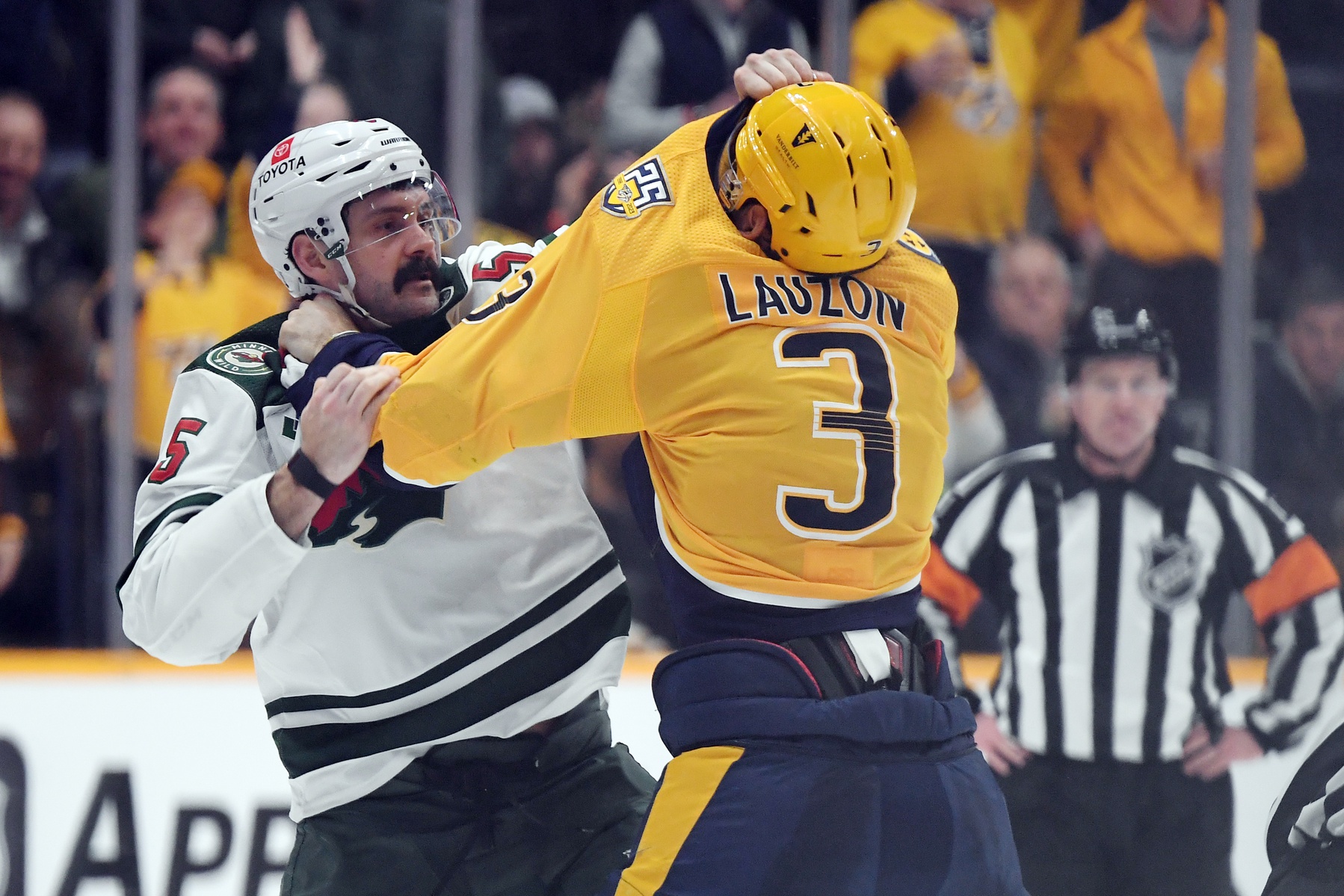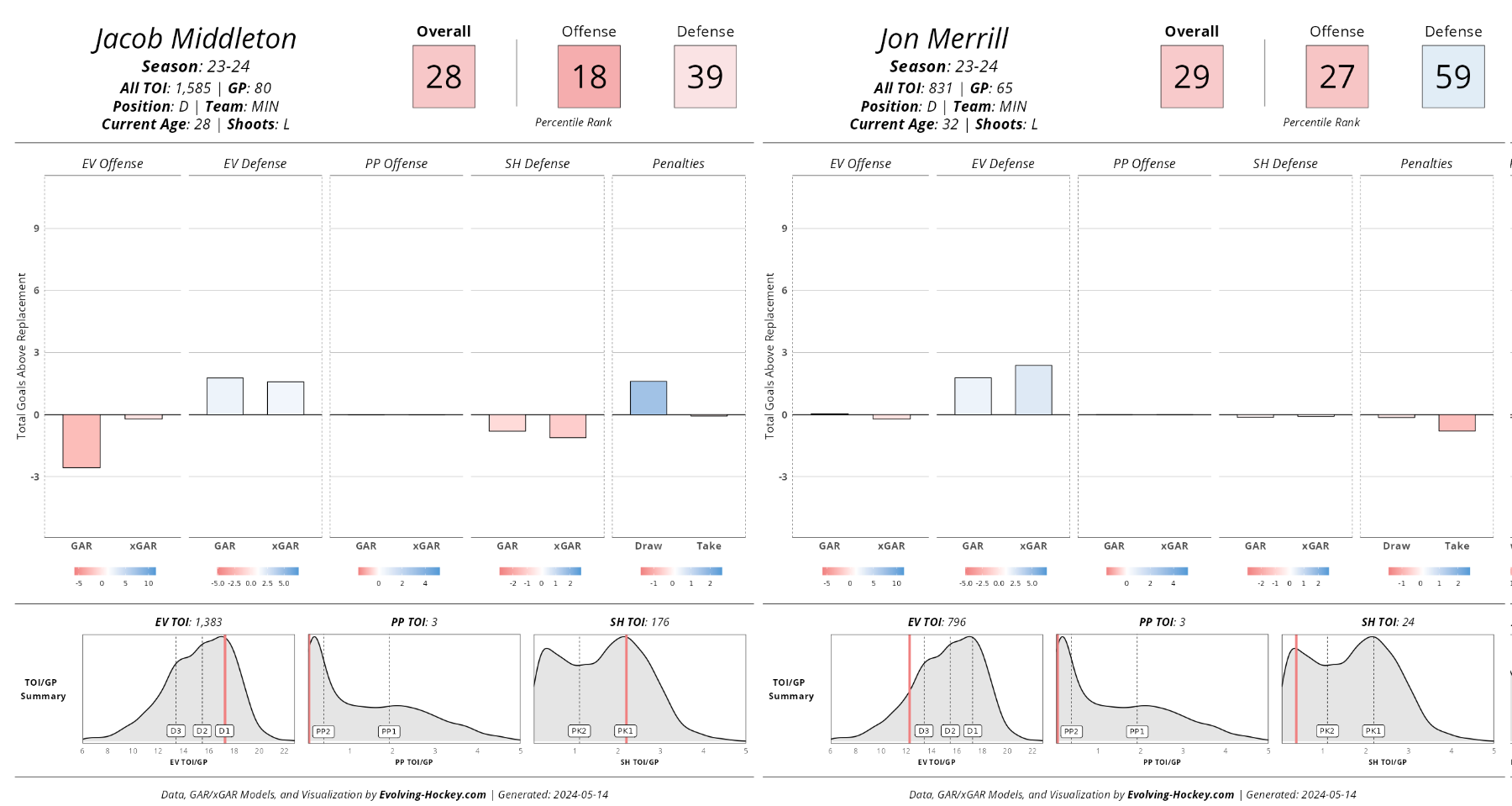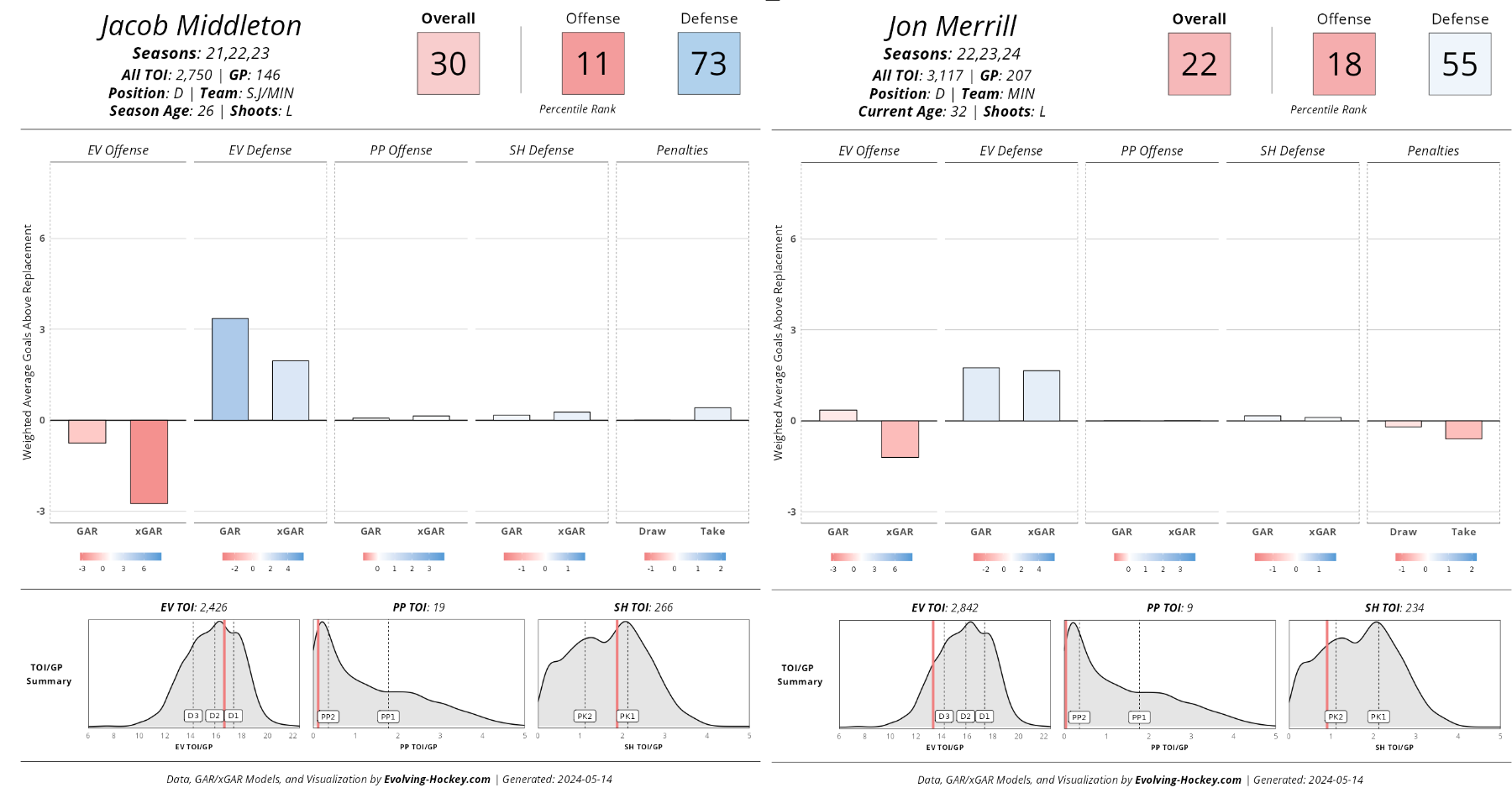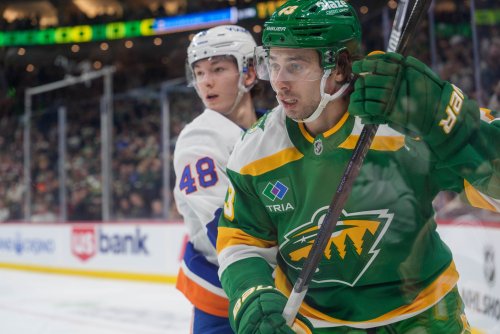
Heading into Year 6 of Bill Guerin's tenure as the Minnesota Wild general manager, it's almost useless to call anyone on the team a "Billy Guy." Yeah, duh. Sure, maybe Chuck Fletcher brought in Jared Spurgeon, Jonas Brodin, Joel Eriksson Ek, Marcus Foligno, and Kirill Kaprizov. Yes, Paul Fenton was in charge when the Wild signed Mats Zuccarello and Ryan Hartman and drafted Matt Boldy. However, none of those players would still be here if they weren't "Billy Guys."
But of a team of "Billy Guys," none might be more of a "Billy Guy" than Jake Middleton. For one, acquiring Middleton was 100% a Guerin trade. He shipped out a Fletcher product, Kaapo Kähkönen, in a low-cost move to land the 6-foot-3 defenseman. People also consider it one of Guerin's best moves, an example of him finding productive players on an ever-tightening budget.
Middleton's "Billy Guy" bonafides run deeper than Guerin unearthing him, though. Middleton fits well into the locker room culture the Wild have built up and even made a lasting contribution by embracing the "Tarps Off" lifestyle.
Really, it's not just that Middleton is a "Billy Guy." The State of Hockey is also full of "Middsy Guys (and Gals and Non-Binary Pals)." You couldn't design a fan favorite in a lab and produce a better result. A big dude who'll get into scraps, goes Tarps Off, calls his teammates "kind of a piece of s---" on National TV (but in a fun way), and rocks a mustache like that? Come on. Who doesn't love this guy?
Let's be real, if you're this much of a "Billy Guy," you're getting re-signed. That's what happens to "Billy Guys." Doesn't matter if you're an established top-six forward, a bottom-six contributor, or a 40-year-old goalie. "Billy Guys" take a haircut from their theoretical open-market value to stay on Billy's team.
That fate seems inevitable for Middleton, who's entering the last year of his three-year, $7.35 million contract. He'll be eligible for an extension on July 1, and the Wild can extend him at any time afterward. After seeing Guerin dole out extensions to Zuccarello, Hartman, and Foligno in the preseason next year, it'd follow that Guerin would want to get things done sooner rather than later. Cost certainty has been Guerin's priority, even projecting past the worst of the post-Zach Parise/Ryan Suter buyout penalties.
But like with many of these extensions to "Billy Guys" in the past two years, the pending Middleton extension makes a ton of sense if you listen to the heart and not as much when you listen to the brain. Are Guerin and the Wild going to fall into the same trap?
Middleton is also in line for a nice payday. He's already making $2.45 million under the cap, which is a hell of an accomplishment for a player who was the Mr. Irrelevant of the 2014 NHL Draft. Evolving-Hockey's contract projections estimate he'll get a sizable bump from that. Their model suggests an extension has a 30% chance of landing at a four-year term, believing his cap hit to fall around $3.78 million. The next-most likely scenario is a five-year term (25%), with an estimated $4.53 million AAV.
Guerin rarely pays sticker price with these extensions. However, $3.5 million on a long-term deal feels like a good guess for the low point of a Middleton extension. Even if Guerin comes across another "bargain" extension with Middleton, though, there will be some major red flags associated with it.
You do have to talk about age a bit here. Middleton's entering his age-29 season, which means a four-year extension will kick in the year he turns 30 and expire when he's 33. That's not ideal, but it's not the biggest problem with a Middleton extension. A long wait to make the NHL and COVID-shortened seasons have left Middleton with just 239 games of NHL experience. A full, healthy season will see him barely over 300 career games, meaning he's got a lot less wear and tear on his body than a typical late-20s player.
That's good because it doesn't make him a prime candidate for a steep decline. The bigger problem has to do with surplus value. The hope a team gets when signing a player to any contract is that they get back surplus -- or at least, comparable -- value on those resources. The contract Guerin acquired from the San Jose Sharks was one where Middleton made the league minimum. That was very valuable.
Does that hold up for the version of Middleton that makes $2.45 million? Not this year, anyway. Looking at Evolving-Hockey's Standings Points Above Replacement, Middleton sat at 0.0 -- or exactly replacement level. Theoretically, the Wild should have been able to find a player for the league minimum to fill that spot and not miss a beat. Dom Luszczyszyn's player valuation models have Middleton's season worth $0.8 million, about the league minimum. Evolving-Hockey and Luszczyszyn figure the Wild left around $1.7 million of value on the table by having Middleton on his current contract.
Middleton's rise to being an NHL regular came from being a solid, cost-effective partner to a top-tier offensive defenseman. He did this with Erik Karlsson in San Jose, then in Minnesota with Spurgeon. Because Spurgeon only played 16 games this season, we saw Middleton outside that very specific role. Points aside, it wasn't too pretty. On the left, you'll see how Middleton performed this year. On the right, you'll see Jon Merrill, the Wild's seventh defenseman.

Merrill has taken a lot of heat from fans this year. However, his on-ice performance doesn't seem much different than Middleton's. You could even argue Merrill was slightly better, though that can be explained by Middleton playing nearly 20 minutes a night versus John Hynes sheltering Merrill more with under 13 minutes.
Still, Middleton looking like a bottom-pairing, defensive defenseman doesn't inspire confidence in a long-term extension. While Middleton didn't get to play with Spurgeon for more than 155 minutes at 5-on-5, he logged 802 minutes alongside Calder Trophy Finalist Brock Faber. The drop-off from Middleton's play with Spurgeon to even as brilliant a player as Faber was staggering.
Spurgeon and Middleton were a rock-solid unit, outscoring opponents 8-5 at 5-on-5 while registering 61.1% of the expected goal share. That's awesome. But with Faber, that goal differential swung hard the other way. Not only did opponents outscore Middleton and Faber 28-38, but they only earned 48.0% of the expected goal share. That's concerning if Minnesota is considering issuing a four- or five-year extension.
Going back to the Middleton/Merrill comparison, it might seem unfair to cherry-pick this season, where Middleton had a rough go of things without his usual partner. You know what? Fair enough. Let's take a look at Middleton's performance in the three seasons before that (2021-23), then stack them up with Merrill's most recent three seasons (2022-24):

That's probably the most generous you can be to Middleton. Even alongside Spurgeon and Karlsson... we're still talking about a fairly Merrill-esque player. That's not an insult. Merrill has a 600-plus game NHL career, is a great locker room guy, and is useful in a specific role in the NHL, even at age-31. Still, anyone who soured on Merrill's dirt-cheap three-year extension ($1.1 cap hit through next year) will probably not love Middleton making three times what Merrill makes for the foreseeable future.
Aside from the money, a Middleton extension also raises the ongoing concern of perpetually extending players on a team whose ceiling has been the first round of the playoffs. Assuming Faber gets paid this summer, a Middleton extension means that Spurgeon, Brodin, Faber, and Middleton will all be under contract through the summer of 2027. Add in Zach Bogosian, and that's five of the Wild's seven defense spots more-or-less locked down for the next two years.
The Wild have a crop of defense prospects in Carson Lambos, Jack Peart, Daemon Hunt, David Spacek, Kyle Masters, and Ryan O'Rourke currently playing in the AHL and ECHL. They had various levels of struggles this season. Still, all are ages 22 and below, and one has to figure a few of them will pan out into useful NHL defensemen. Why limit your ability to upgrade internally for years to come?
It makes sense that preserving roster spots for prospects isn't a priority until those players start taking bigger steps. If the Wild can extend an above-average player for the foreseeable future, they should do it instead of hoping one of your magic beans grows to the clouds. However, to block off a spot for years to come for a relatively expensive player whose upside is Merrill seems short-sighted.
Still, it feels inevitable. Looking at the extensions that have curdled in the eyes of Wild fans -- Merrill, Alex Goligoski, and Freddy Gaudreau -- we see a common theme. These bargain pick-ups became "Billy Guys," and Guerin couldn't let go of them. There's little to suggest Guerin has learned to walk away from his guys when it's time. Therefore, there's little to suggest a Middleton extension won't happen and suffer a similar fate to those role players who came before him.
Think you could write a story like this? Hockey Wilderness wants you to develop your voice, find an audience, and we'll pay you to do it. Just fill out this form.
-
 4
4






Recommended Comments
Join the conversation
You can post now and register later. If you have an account, sign in now to post with your account.
Note: Your post will require moderator approval before it will be visible.